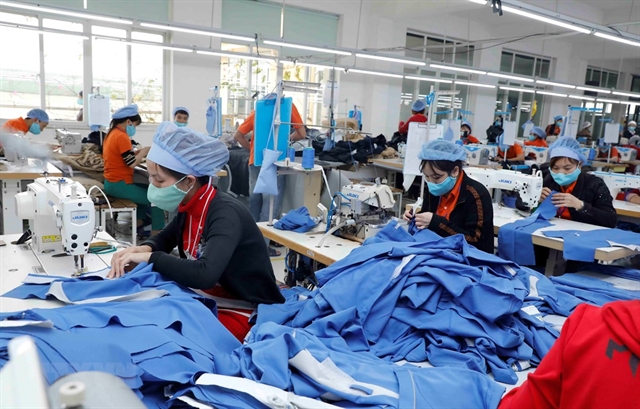 Economy
Economy


|
| Workers during a shift at a textile company in the northern province of Hưng Yên. VNA/VNS Photo |
HÀ NỘI Taking full advantage of Việt Nam's numerous free trade agreements (FTAs) and rolling out measures to promote trade are keys to boosting the country's export in the future, said the Ministry of Industry and Trade (MoIT).
According to the ministry, the Southeast Asian economy's export picked up in March, reaching US$29.57 billion, a 13.5 per cent increase from February. Total exports during the first three months of the year dropped by 14.8 per cent compared to last year.
Domestic firms were hit the hardest, with a drop of 17.4 per cent compared to foreign firms, who also experienced a drop of 10 per cent.
The ministry said the situation wouldn't likely improve soon as global demand for goods slows down, especially in major markets such as the EU and the US. Competition has been on the rise since the reopening of the Chinese market.
Việt Nam's agriculture and aquaculture export for the first quarter of 2023 is projected to reach $6.86 billion, a 7.5 per cent decrease from last year.
Seafood firms have voiced concerns over a lack of orders, a stark difference from what is usual for this time of year.
"We have been hit hard by both weaker demand and a strengthening đồng against the dollars," said a representative from the seafood industry.
Tô Tường Lan, deputy director-general of the Vietnam Association of Seafood Exporters and Producers (VASEP), said orders from all markets were fewer during the first three months of the year.
Lan said a global credit crunch hindering retailers from stocking up, on top of increased competition, has resulted in fewer orders this year.
Industrial sectors also reported lower export, with just $67.5 billion in value during the last three months, a 13.1 per cent and mineral exports dropped by 3.1 per cent compared to the same period last year.
On the other hand, Vietnamese rice has seen some success in both raising export quality and prices. The country exported nearly 70 per cent more rice in the first quarter of 2023 compared to the same period last year.
The US remained Việt Nam's largest buyer, with a total value of goods imported at $20.57 billion.
Đỗ Ngọc Hưng, Việt Nam's trade representative in the US, said Việt Nam-US trade would likely continue to grow strong for the foreseeable future with the two countries seeking out new products and services, removing trade barriers and work together on products safety and standards.
Hưng said his office has been holding regular working sessions to help connect Vietnamese and US businesses while keeping Vietnamese exporters up-to-date with the US's trade policies.
During the first quarter of 2023, Việt Nam imported $75.1 billion in goods and services, a 14.7 per cent decrease year-on-year.
The country maintained a trade surplus of $650 million in March to bring the first quarter's trade surplus to $4.07 billion, a marked improvement over the same figure last year at $1.87 billion.
The ministry said Vietnamese seafood and textile products would likely face increased competition in many of their major markets as strong competitors, including Bangladesh, Cambodia, El Salvador, India, and Indonesia, have managed to sign FTAs with said markets.
The ministry called on firms to make greater efforts to meet consumer demand in foreign markets, start additional marketing campaigns, and improve product safety and quality. VNS




